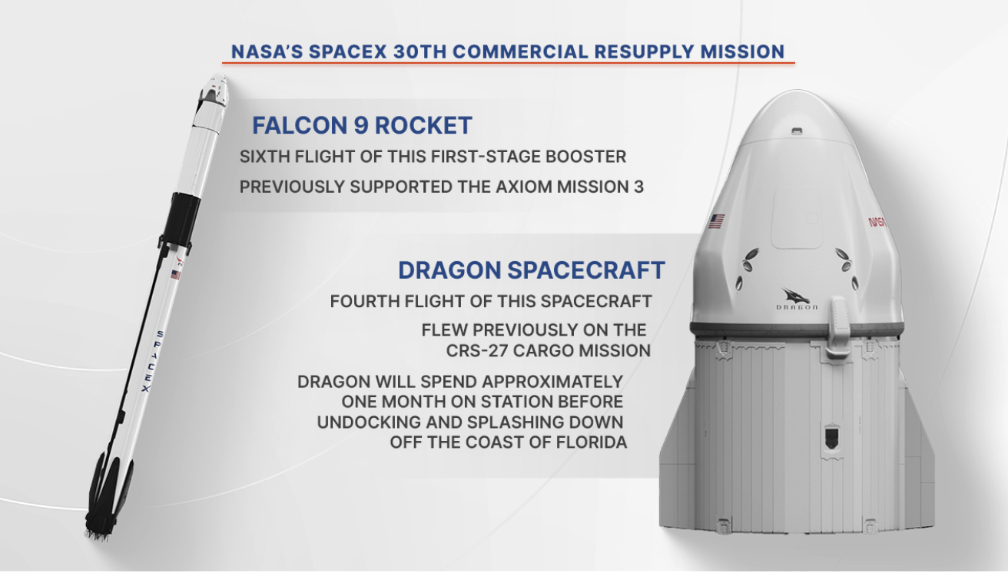
The next resupply mission to the International Space Station (ISS) will carry more than 40 payloads sponsored by the ISS National Laboratory®, including in-space production applications projects, technology demonstrations, life science experiments, and student-led inquiries. These investigations, launching on SpaceX’s 30th Commercial Resupply Services (CRS) mission, funded by NASA,aim to improve life on Earth through space-based research and foster a sustainable economy in LEO.

Below highlights a sample of those payloads, and findings could lead to advances in technology for future spaceflight and the development of novel therapeutics for use both on Earth and in space.
- Redwire Corporation is partnering with pharmaceutical company Eli Lilly & Company and Butler University for two investigations leveraging Redwire’s Pharmaceutical In-space Laboratory (PIL-BOX), a platform to crystallize organic molecules in microgravity. Results from this research could lead to improved therapeutics to treat an array of conditions. This research continues Eli Lilly’s space journey, as the company has launched a variety of investigations to the orbiting laboratory over the years for the benefit of patient care on Earth.
- A collaboration between Boeing and CSIRO (an Australian government agency responsible for scientific research) will test the ability of a Multi-Resolution Scanner to create 3D maps of the space station. To do this, the project will use Astrobee, an autonomous, free-flying robotic system on station. This scanner technology could be useful in future exploration efforts and in remote environments for manufacturing and maintenance tasks, such as identifying leaks or checking for damage to systems.
- The National Stem Cell Foundation will continue to examine the mechanisms behind neuroinflammation, a common feature of neurodegenerative diseases. To carry out this study, the research team created 3D brain models derived from induced pluripotent stem cells of patients with Alzheimer’s and Parkinson’s diseases as well as primary progressive multiple sclerosis.
- Airbus U.S. Space & Defense is launching an enhancement to the station’s Bartolomeo platform. Called ArgUS, the external mechanical platform has added capabilities for hosting payloads in LEO. Once ArgUS is installed, it will host multiple payloads on this mission, including SpaceTV-1, an optical video system designed to livestream high-definition views of Earth and the space station.
- A project from the University of Connecticut will examine the feasibility of producing Janus base nanomaterials in microgravity that could help repair cartilage and reduce joint inflammation. Through this project, researchers aim to advance in-space manufacturing concepts for these materials, which could significantly improve patient care for orthopedic injuries and degenerative joint diseases like arthritis, as there is currently no way to repair damaged cartilage.
Additionally, two investigations flying on NASA’s SpaceX CRS-30 mission were selected through the Technology in Space Prize, funded by Boeing and the Center for the Advancement of Science in Space™ (CASIS™), manager of the ISS National Lab, as part of the MassChallenge startup accelerator program.
- An investigation from biopharmaceutical company Oculogenex will use the space station to test a novel gene therapy to prevent and possibly even reverse vision loss from age-related macular degeneration (AMD). Findings will help advance the company’s therapeutic, which can potentially treat AMD-related symptoms in millions of Americans.
- A project from biomedical startup Encapsulate aims to leverage the microgravity environment of the space station to validate an automated tumor-on-a-chip system that grows patient-derived cancer cells to test chemotherapy drugs. The company seeks to use precision diagnostics for personalized cancer treatments.
SpaceX’s Falcon 9 rocket will launch these investigations and more no earlier than Thursday, March 21, 2024, at 4:55 p.m. EDT, from Space Launch Complex 40 at Cape Canaveral Space Force Station in Florida.
